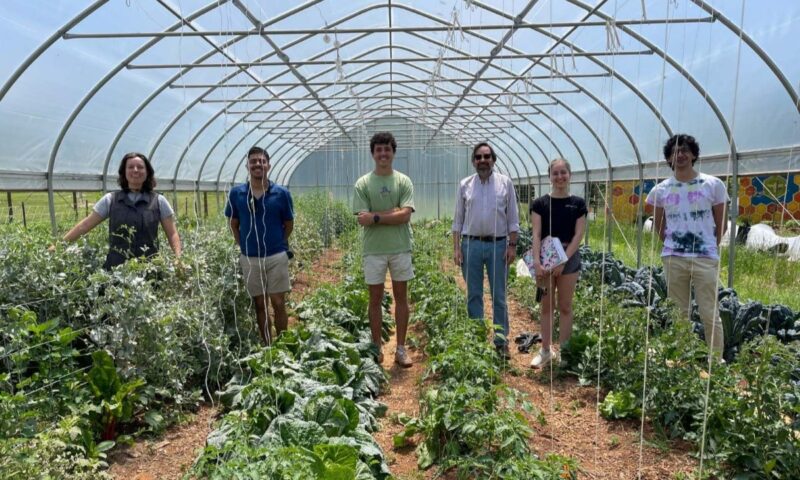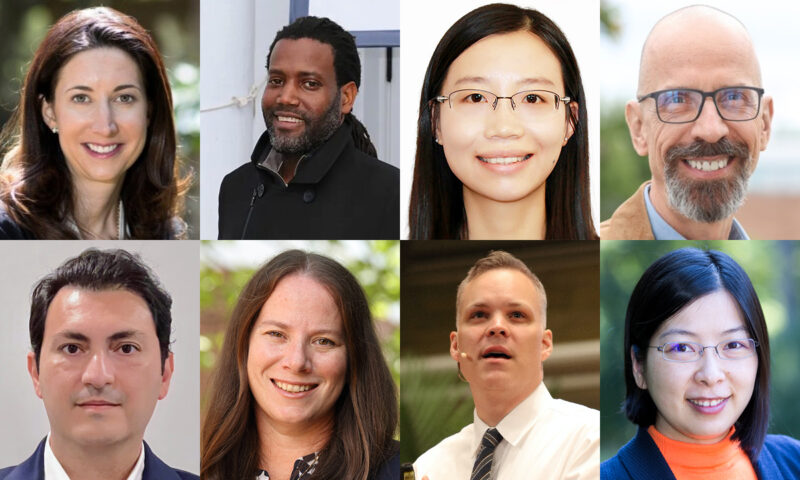McIntire Professors Jingjing Li and Reza Mousavi will collaborate with four of their University peers from the Department of Psychology on “UVAi Vanguard: Transforming UVA’s Academic Landscape with AI & Large Language Models,” a project supported by a three-year grant of $112,800 awarded by the Jefferson Trust.
The project connects thought leaders from the School of Commerce and the College of Arts & Sciences on technologies that are impacting nearly every aspect of our lives.
Li says that the team intends to establish a cutting-edge research and teaching laboratory for the University, dedicated to exploring and catalyzing future innovations in large language models (LLMs).
“This initiative is not only about pushing the boundaries of technological capabilities but also about deepening our understanding of the social and psychological ramifications of AI-generated content. Through this lens, we seek to identify both opportunities and challenges presented by AI, addressing them with nuanced, ethically informed approaches,” Li says, explaining that the team is committed to advancing computational techniques of LLMs. “Our goal is to contribute to the development of more sophisticated, efficient, and responsible AI tools that can better serve humanity. By fostering interdisciplinary collaboration, we aim to harness the collective expertise of scholars across various fields, thereby enriching the academic and practical applications of AI.”
Mousavi envisions the project helping all members of the University community to benefit from new tech, a realization he says came to him while serving on UVA’s Generative AI (GenAI) Taskforce.
“Our students can leverage these tools to learn better and more. Our instructors can use these tools to teach more effectively. Our researchers can use these tools to enrich and extend research domains. But all of these benefits depend on the proper use of these tools,” he says.
What defines proper use? Mousavi explains it thusly: “If an individual is capable of assessing the quality of a response generated by GenAI tools without assistance, they are encouraged to use the tool. However, if an individual lacks the necessary background knowledge in the relevant field and is unable to evaluate the quality of the response provided by GenAI, they should refrain from using these tools until they have improved their foundational understanding in that particular domain.”
Using that as a basis, Mousavi’s objective for this project is to discover avenues for examining who should use these GenAI tools, how they should use them, and at what stage of their academic work.
Research Connections
Mousavi traces his interest in researching the topic of pre-trained language models back to the introduction of the groundbreaking technology.
“Since the debut of pre-trained language models in 2018, my research has extensively incorporated these advanced models. My primary interest lies in the exploration of technology’s societal impacts, a domain where language models serve as pivotal instruments. By modifying these models to analyze specific textual attributes—such as empathy, informativeness, and emotional expressions—I employ their capabilities to examine and validate hypotheses originating from social science research,” he explains. “This methodology not only harnesses the power of large language models (LLMs) for deeper insights into societal dynamics but also bridges the gap between technological advancements and their real-world implications. Through this approach, my work contributes to a nuanced understanding of how technology influences social constructs and individual behaviors, positioning LLMs as essential tools in the investigation of technology’s societal footprint.”
For Li, who has more than 16 years harnessing machine learning, big data analytics, and artificial intelligence, her career has been defined by a dedication to addressing complex business and societal challenges, something she has undertaken by often looking at these issues through the prism of natural language processing (NLP).
“My work has consistently leveraged NLP and AI to derive actionable insights from diverse data sources. Notably, I have employed these technologies to distill constructs and relationships from behavioral publications, extract psychometric dimensions from user-generated content, and isolate PICO (population, intervention, comparison, outcome) elements from medical literature to enhance evidence-based medical practices,” says Li. Noting that advanced AI and LLMs represent a significant milestone in her own professional journey, she sees the tech capable of producing novel opportunities that could redefine “the scope and impact of research, teaching, and societal engagement.”
Transcending Academic Boundaries
Mousavi introduced Li to the Psychology team, having worked with Psychology Professor Hudson Golino on a 3Cavaliers grant the two received in 2021. He sees the combination of their disciplines offering unique advantages.
“At McIntire, we are very interested in finding the best ways to use these tools for the best possible applications. We are focused on the use cases. In Psychology, they are interested to know more about the psychological processes that inform us how humans behave under different conditions,” he says. “Putting these two domains together, we could discover the main processes involved in efficient use of these tools in a variety of real-world scenarios. This understanding helps us identify certain recommendations and best practices to help the UVA community and beyond to use these tools more effectively and efficiently.”
The greatest challenge Mousavi says he and his fellow researchers face concerns the nature of studying nascent and ever-changing technology.
“Given that the mainstream use of GenAI in an academic setting is new and emerging, it might be difficult to remain focused on very specific topics. As we conduct our research, we may come across new ideas and patterns,” he says. “The technology itself is also rapidly evolving. Hence, asking timely and relevant questions with an extended shelf life is difficult in this domain.”
Li believes that the collaboration uniquely positions the team to lead the way by bridging academic research with industry practices around the complex impact of AI and LLMs—within both commerce and society. “Business researchers bring a wealth of contextual knowledge that enriches our comprehension of these technologies’ implications, enabling us to explore innovative intersections of commerce, technology, and human behavior. Our colleagues in the Psychology department contribute profound insights into the psychological aspects that influence the development, adoption, and management of LLMs, highlighting how cognitive and behavioral factors can shape technological advancement and application.”
“The interdisciplinary team brings extensive technical expertise in AI, machine learning, and psychological analysis, offering a comprehensive perspective that transcends traditional academic boundaries,” Li adds. “This collaboration is further strengthened by the Psychology department’s robust Ph.D. program, which not only facilitates the scalability of our research efforts but also nurtures the next generation of researchers. This synergy ensures that our work not only advances the theoretical understanding of LLMs but also contributes practical insights for their ethical and effective integration into society and business practices.”



